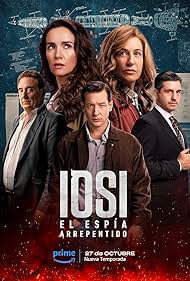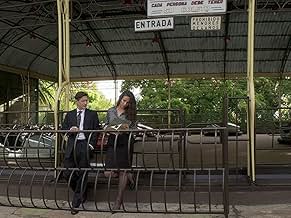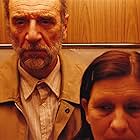IMDb RATING
7.7/10
1.5K
YOUR RATING
An Argentinean intelligence agent infiltrates the Jewish community to gather information that is then allegedly used to perpetrate two of the worst terrorist attacks in Latin American histor... Read allAn Argentinean intelligence agent infiltrates the Jewish community to gather information that is then allegedly used to perpetrate two of the worst terrorist attacks in Latin American history, leaving over 100 dead.An Argentinean intelligence agent infiltrates the Jewish community to gather information that is then allegedly used to perpetrate two of the worst terrorist attacks in Latin American history, leaving over 100 dead.
- Awards
- 11 wins & 25 nominations
Browse episodes
Storyline
Featured review
Summary
Iosi, The Regretful Spy is a series that disappoints, since it delivers much less than what it promises (in every sense), it describes the historical and well-known anti-Semitism of the Argentine security forces, it opens several umbrellas and falls into a certain lack of personality inherent to these productions concerned with maintaining a "for export" profile. It sustains the interest of the viewer (perhaps seeing more because of the theme and its good cliffhangers than because of its dramatic development), it has a leading role, which I think is problematic, by a nondescript Gustavo Bassani at times, and interesting performances by Alejandro Awada as a shady banker, of Carla Quevedo and Natalia Oreiro as a ruthless supervisor of the intelligence services as a femme fatale.
Review:
Already in the first 5 minutes of chapter 1, the protagonist himself, José Pérez (alias Iosi Peres) defines himself as an "agent of the intelligence service of the Federal Police, infiltrated in the Jewish community since the beginning of democracy and for 20 years. " and that has information on the "greatest criminal conspiracy in Argentine history, all at the service of illegal arms trafficking, where governments, local and foreign intelligence services, terrorist organizations, bankers, former soldiers are involved...". This criminal conspiracy has to do (in principle) with the attack on the Embassy of Israel in Buenos Aires in 1992, which the temporary separators of the series take permanently as a reference.
On the other hand, this miniseries co-written by Sebastián Borensztein and Daniel Burman (along with Natacha Caravia, Sergio Dubcovsky and Andrés Gelós) and co-directed by the first two opens the umbrella at the beginning of each chapter with the sign "While this story is inspired by certain real events, is a work of fiction. The characters and events portrayed are fictitious, and any resemblance or identification with the name, character or story of any real person, living or dead, or any company, is entirely incidental and unintentional."
One of the anti-Semitic myths that permeated all the security forces in Argentina (and Argentine fascist nationalism in general) was that of a supposed Plan Andinia, consisting of establishing an independent Jewish state in Argentine Patagonia. And it is under this hypothesis that the intelligence agent of the Federal Police (although later a poster speaks of the "Police of Buenos Aires") José Pérez (Gustavo Bassani), infiltrates like Iosi Peres in the Buenos Aires Jewish community in the early years 80s, already under the radical democratic government of Raúl Alfonsín, supervised by agent Claudia (Natalia Oreiro). To do this, and somewhat coincidentally, Iosi is linked to the banker Saúl Menajem (Alejandro Awada) and the shady and ex-professed business of him with a left-wing militant group of the Jewish community.
The story that unfolds throughout the 80s alternates with another timeline that takes place in 2007 and 2008, with an Iosi already "repentant" and confronted with the services of which he was a part.
What are the revelations that this story based on a book by journalists Horacio Lutzky and Miriam Lewin will bring? In what did Pérez's repentance consist and to what causes was it due? Can a character with these characteristics be redeemed?
Unfortunately, the story does not fully meet expectations in terms of revelations and the parties involved in the attack. This has to do, obviously, with what Pérez revealed to his interviewers (at least in the cut that the series makes) and with the fact that the authorship of both attacks remains unsolved. On the other hand, the aspects of the protagonist's personal life, which incorporates fictional elements to others based on reality, are not too new or interesting and some are revealed as downright hackneyed. In addition, certain aspects of the plot would be implausible without that (supposed) support in reality.
The story is indeed useful to reflect the visceral and historical anti-Semitism of the federal security forces and their "services", to the point that their hypothesis of conflict (the Andinia Plan) clouded the analysis of the relevant information that their spy was collecting, revealing a tragicomic ineptitude. The criminal autonomy that these services from the dictatorship under democratic governments were managed with is also clear.
I confess that I had problems with Gustavo Bassani's (an actor from the theater) interpretation of his Iosi. It appeals to an imperturbable register, almost impenetrable, close to the anodyne, probably marked by the direction, with a diction reminiscent of a cinema from another era; his record contrasts with that of the rest of the cast. Yes, the performances of Alejandro Awada are remarkable (his character, the richest, and that of Bassani establish a relationship by interesting moments), Carla Quevedo as Eli, partner of a left-wing Jewish leader and Natalia Oreiro, with her cold and ruthless Paula, a convinced femme fatale anti-Semite.
As a thriller, at times it suffers from a certain lack of tension and some delay and, as is often the case with many miniseries, it could have taken fewer chapters. The action and violence scenes are well resolved, although the series (shot in Montevideo) is more focused on intrigue and relationships, and there is concern about filming a product for export, understood as a certain lack of personality suitable for the world mainstream.
Iosi, The Regretful Spy is a series that disappoints, since it delivers much less than what it promises (in every sense), it describes the historical and well-known anti-Semitism of the Argentine security forces, it opens several umbrellas and falls into a certain lack of personality inherent to these productions concerned with maintaining a "for export" profile. It sustains the interest of the viewer (perhaps seeing more because of the theme and its good cliffhangers than because of its dramatic development), it has a leading role, which I think is problematic, by a nondescript Gustavo Bassani at times, and interesting performances by Alejandro Awada as a shady banker, of Carla Quevedo and Natalia Oreiro as a ruthless supervisor of the intelligence services as a femme fatale.
Review:
Already in the first 5 minutes of chapter 1, the protagonist himself, José Pérez (alias Iosi Peres) defines himself as an "agent of the intelligence service of the Federal Police, infiltrated in the Jewish community since the beginning of democracy and for 20 years. " and that has information on the "greatest criminal conspiracy in Argentine history, all at the service of illegal arms trafficking, where governments, local and foreign intelligence services, terrorist organizations, bankers, former soldiers are involved...". This criminal conspiracy has to do (in principle) with the attack on the Embassy of Israel in Buenos Aires in 1992, which the temporary separators of the series take permanently as a reference.
On the other hand, this miniseries co-written by Sebastián Borensztein and Daniel Burman (along with Natacha Caravia, Sergio Dubcovsky and Andrés Gelós) and co-directed by the first two opens the umbrella at the beginning of each chapter with the sign "While this story is inspired by certain real events, is a work of fiction. The characters and events portrayed are fictitious, and any resemblance or identification with the name, character or story of any real person, living or dead, or any company, is entirely incidental and unintentional."
One of the anti-Semitic myths that permeated all the security forces in Argentina (and Argentine fascist nationalism in general) was that of a supposed Plan Andinia, consisting of establishing an independent Jewish state in Argentine Patagonia. And it is under this hypothesis that the intelligence agent of the Federal Police (although later a poster speaks of the "Police of Buenos Aires") José Pérez (Gustavo Bassani), infiltrates like Iosi Peres in the Buenos Aires Jewish community in the early years 80s, already under the radical democratic government of Raúl Alfonsín, supervised by agent Claudia (Natalia Oreiro). To do this, and somewhat coincidentally, Iosi is linked to the banker Saúl Menajem (Alejandro Awada) and the shady and ex-professed business of him with a left-wing militant group of the Jewish community.
The story that unfolds throughout the 80s alternates with another timeline that takes place in 2007 and 2008, with an Iosi already "repentant" and confronted with the services of which he was a part.
What are the revelations that this story based on a book by journalists Horacio Lutzky and Miriam Lewin will bring? In what did Pérez's repentance consist and to what causes was it due? Can a character with these characteristics be redeemed?
Unfortunately, the story does not fully meet expectations in terms of revelations and the parties involved in the attack. This has to do, obviously, with what Pérez revealed to his interviewers (at least in the cut that the series makes) and with the fact that the authorship of both attacks remains unsolved. On the other hand, the aspects of the protagonist's personal life, which incorporates fictional elements to others based on reality, are not too new or interesting and some are revealed as downright hackneyed. In addition, certain aspects of the plot would be implausible without that (supposed) support in reality.
The story is indeed useful to reflect the visceral and historical anti-Semitism of the federal security forces and their "services", to the point that their hypothesis of conflict (the Andinia Plan) clouded the analysis of the relevant information that their spy was collecting, revealing a tragicomic ineptitude. The criminal autonomy that these services from the dictatorship under democratic governments were managed with is also clear.
I confess that I had problems with Gustavo Bassani's (an actor from the theater) interpretation of his Iosi. It appeals to an imperturbable register, almost impenetrable, close to the anodyne, probably marked by the direction, with a diction reminiscent of a cinema from another era; his record contrasts with that of the rest of the cast. Yes, the performances of Alejandro Awada are remarkable (his character, the richest, and that of Bassani establish a relationship by interesting moments), Carla Quevedo as Eli, partner of a left-wing Jewish leader and Natalia Oreiro, with her cold and ruthless Paula, a convinced femme fatale anti-Semite.
As a thriller, at times it suffers from a certain lack of tension and some delay and, as is often the case with many miniseries, it could have taken fewer chapters. The action and violence scenes are well resolved, although the series (shot in Montevideo) is more focused on intrigue and relationships, and there is concern about filming a product for export, understood as a certain lack of personality suitable for the world mainstream.
- How many seasons does Yosi, the Regretful Spy have?Powered by Alexa
Details
- Release date
- Country of origin
- Official site
- Languages
- Also known as
- Iosi, el espía arrepentido
- Filming locations
- Production companies
- See more company credits at IMDbPro
- Color
Contribute to this page
Suggest an edit or add missing content

































